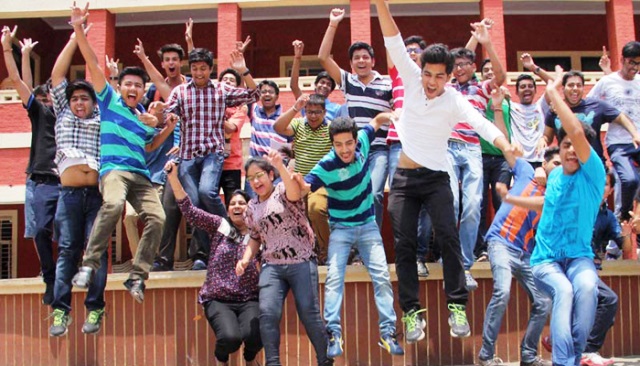
Advertisement
Yes, I am aware that I am writing for the ‘toppers’—those who have done extremely well in board examinations, broken all records, and scored something like 499/500. While I congratulate them and covey my best wishes for their life-trajectories, I also warn them, and want to make them see the danger in the self-perception: ‘I am the topper. I know. I am superior to others.’ I know that in this success-obsessed society I run the risk of being misunderstood. And even my young friends—the bunch of the ‘toppers’—might consider me as a man without humor, a man burdened with ‘conscience’. Yet, I believe that as a teacher, I should try my best to speak the truth.
My first appeal to the toppers is to realize that this cult of quantification (History-99; Physics-100; English 99) is devoid of pedagogic and ethical substance. It does not represent the ecstasy of learning— the ability to go deeper, contemplate in a relaxed mood, evolve a distinctive way of seeing, and relating to the world creatively and meaningfully. Instead, it represents the mastery over a technique—a recklessly violent process of drilling and mechanization of human consciousness through which one memorizes a series of discrete pieces of information (from the date of Gandhi-Irwin pact to a trigonometric formula), and reproduces this ‘packaged knowledge’ in highly standardized/non-imaginative examinations. It has no relationship with the literary/poetic imagination, the wonder of science and the critical consciousness of social sciences. Well, I know that they have worked hard; they have mastered this ‘skill’, or to use Prime Minister Narendra Modi’s words, they have become ‘exam-warriors’.
However, it seems that that in the process they have missed what really matters—the joy of reading a great novel , the ecstasy of being a wanderer with the curiosity to look at the splendid architectural design of a monument, and the ability to see the merger of Physics and aesthetics in the way nature unfolds itself in the making of a rainbow or in the vibrations of the sea as the sun sets and darkness descends. To be a ‘topper’ in this ugly system, it seems, is to lose life. In the process of achieving ‘success’ one has actually failed. Yes, even when society is saluting these ‘toppers’, coaching centres are publishing their photographs in newspapers, and their admissions in Stephens and LSR are becoming easy and smooth, I am warning them because I love these young minds; and I believe that they should not be hypnotized by these ‘success narratives’.
My second appeal to them is to think whether they have really chosen their ‘aims’ in life. Do they ever have an opportunity to look at themselves, to understand their unique traits and aptitudes? Or is it that their life-pursuits have already been decided by their parents for whom there is no horizon beyond IIT-IIM, Stephens/America highway towards ‘success’, and constructed by a society that values outer glamour more than inner fulfillment? It is sad that hardly do we get an opportunity to meet a ‘topper’ who speaks a different language, imagines a new possibility, retains the ‘madness’ without which no breakthrough is possible. Frankly speaking, they bore me. Yes, most of them are clever and smart—utter conformists. Is it the destiny of a ‘topper’? You lose originality, you become a victim of ‘brand consciousness’ (If not IAS, think of Princeton or LSE; if not economics in Shri Ram College of Commerce, there is psychology in LSR); you measure life’s achievement through a scale that has no appreciation of authentic existence filled with the rhythm of life.
And finally, my third appeal to them is to resist the temptation of falling into the trap of narcissistic pride. As society celebrates your success, newspapers publish your interviews, and your school principals recall how good you were at everything—from sports to theatre, and transform you into some sort of ‘capital’ for selling the brand, you may think you are super-human, and God has made you different from those who have failed, and that is why, your success is so special. This, my friends, is the ultimate danger. Who are the much- condemned failures? Those who do not have good marks, and could not make it into IIT or AIIMS? If you think so, you are making a big mistake. A sick society or a faulty pattern of school education constructs these ‘failures’. Well, many of them have not done well in Mathematics or English. But the ‘toppers’ (yes, I am asking you)—have you ever noticed their innate potential that the present system could never tap? Possibly, one is a potential photographer, a creative artisan, a botanist, a healer, a good human being, an activist.
A system that judges a person through abstract numbers—yes, 499/500—has no eyes to see what is really worth seeing: the inherent divinity and creativity in each of us. It kills human possibilities. While it stigmatizes millions of ‘failures’; it has also finished you, my friends. You are thinking that you are the ‘topper’. However, beneath the mask lies the tragic story—the story of complete dehumanization.
Don’t misunderstand me, friends. I want you to find creative joy in your life. I want you to radiate love and positive vibrations in the world. I want you to spread the message of equity and togetherness, not the practice of exclusion with the binaries of ‘success’ and ‘failure’. For me, your soul is more important than the bio-data you are striving for: DPS topper…IIT Kanpur…American green card! Likewise, your school friends who have ‘failed’, for me, are beyond 50 in Physics and 41 in English; they are possibly the gifted ones capable of transforming the ordinary into extraordinary.
Avijit Pathak is a Professor of Sociology at JNU, New Delhi.
***











